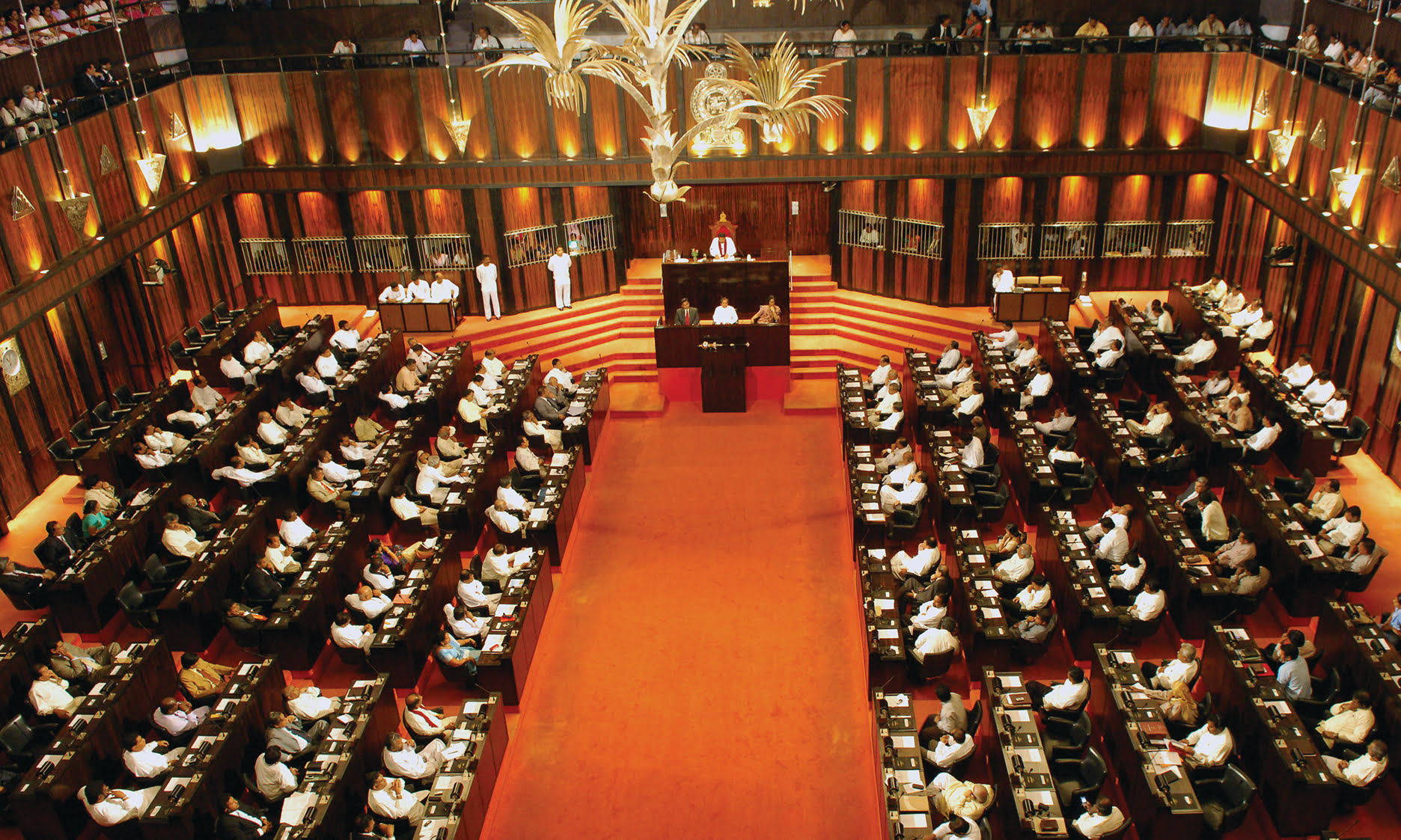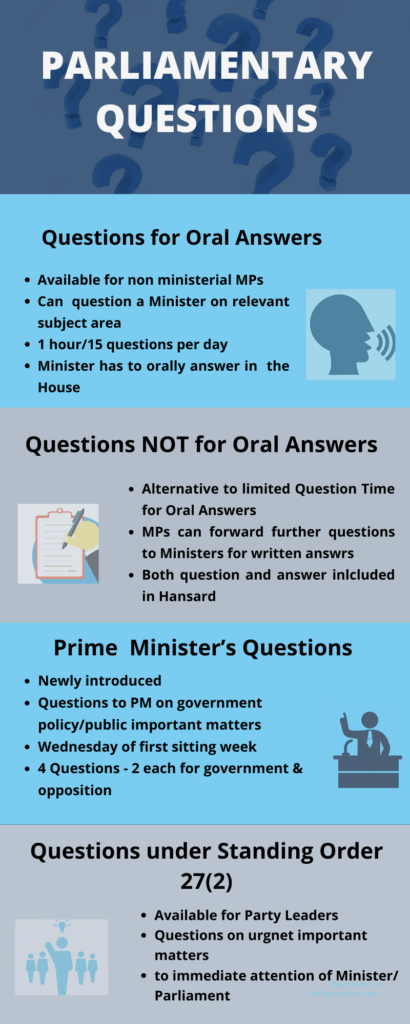
11 Sep Parliament Series: Parliamentary Questions and Adjournment Motions
Effective Tools for MPs to Hold the Government Accountable
As we have discussed in our previous article, there are many avenues within the Parliamentary System for the Members of Parliament (MPs) to represent their citizens. Some of these platforms are available as part of the Business of Parliament while the others are discharged as a part of Parliamentary Committees.
The main items that take place in the Chamber of the House within a day of the Parliament are usually referred to as the Business of Parliament. It is conducted in the order set out by The Standing Orders of Parliament (the agreed rules under which procedure, debate and the conduct of Members in the House are regulated). In this article we observe the following two mechanisms which operate inside the House where public matters are brought up exclusively as a part the of Business of Parliament.
- Parliamentary Questions
- Motions or questions at the Time of Adjournment
Parliamentary Questions
Parliamentary Questions are one of the most significant and prominent mechanisms through which the MPs can put forward oral and written questions to the Prime Minister or to any other Minister with regard to the public affairs. The concept of Parliamentary Questions has its roots in the Westminster System of the United Kingdom and believed is to be developed as a Parliamentary practice in 19th Century.
Why Parliamentary Questions are effective?
Grant a right to MPs to question government bodies obligating them to provide an answer within a legally defined time
Ensures the Parliament oversight over government
Hold the government accountable for its work, policy decisions and actions to the Parliament and through Parliament to the people.
In Sri Lanka, there are specific rules and procedures with regard to Parliamentary Questions mandated by the Standing Order 31 – 37. They enable the MPs to ask Ministers questions ranging from national policies to individual grievances of people within the scope of their respective ministry. Questions relating to the subjects assigned to the President could be asked from the respective Deputy Minister and where there is no Deputy Minister the question could be asked from the Prime Minister.
They can be mainly categorized into two.
Questions for Oral Answers
Questions NOT for Oral Answers
Additionally, the Standing Orders provide for the following special categories of questions too.
Questions under Standing Order 27 (2)
Prime Minister’s Questions
Let us now get a comprehensive idea about the role and scope of these categories.

Questions for Oral Answers
These are the types of questions where the Minister is obliged to orally answer inside the Chamber of Parliament. When a Member intends to ask a question from a Minister he should submit it to the Secretary General of Parliament in advance to the intended day of asking the question. The Staff of the Parliament Secretariat edit the question to be matched with the Standing Orders and get translated into three languages. The question will be forwarded to the relevant Ministry for them to prepare the answer. A date will be scheduled for the question to be asked in the Parliament. These questions should be included in the Order Book of Parliament [1] before seven days from the date scheduled to be asked in Parliament. The Minister has to orally state out the answer he has prepared.
When a question is asked the relevant Minister is required to be present in Parliament and reply (in his absence the deputy minister is authorized to reply). A minister who is unable to present on the day should obtain prior leave of the Speaker and inform the Speaker the arrangements that such Minister has made to have the question answered. If the MP who asked the question or any Member has any question regarding the given answer they can put forward two supplementary questions.
In every Parliament Session an hour is allocated for the question time and a member can ask only two oral questions per day.
[1] This sets out the scheduled program of the Parliament for a particular period of time (it can be weekly, monthly etc). The Oder Book is used to notify the necessary parties about a certain motion, question and other relevant notices.
Questions NOT for Oral Answers
As there are only a limited number of questions which could be asked during the question time, an MP has the option of asking further questions from a Minister expecting written answers. The same procedure followed with regard to the Questions for Oral Answers should be followed. However, an MP can submit any number of questions to be asked from a Minister and Minister has to forward his answer to the Secretary General of Parliament prior to the scheduled date. The question will not be asked orally in the Parliament and no answer shall be given. However, both the question and the answer will be included in the Hansard of the Parliament as a part of the business of Parliament taken place on that particular day. A Member does not have the option of asking supplementary questions on the written answer.
This is an effective platform for MPs to hold the Ministers accountable and clarify issues of public importance without delay.
Questions under Standing Order 27 (2)
These questions are specifically provided for the matters of urgent public importance. This opportunity is given to the Leader of the Opposition and the Leaders of recognized political parties in Parliament to raise questions pertaining to matters which need immediate attention. Therefore, they do not require to be included in the Order Book of Parliament before seven days. According to the accepted parliamentary procedure any party leader intending to ask the question should give due notice to the Secretary General before noon 12 of the day before the intended day of asking the question. The relevant Minister then is duly noticed for him to prepare the answer.
Prime Minister’s Questions
Following the constitutional convention of UK House of Commons, Prime Minister’s question time was introduced to Parliament of Sri Lanka in 2018 with the amendment of its Standing Orders. This is one of the most significant platforms available for backbencher MPs (MPs who do not have a ministerial responsibility) to question the Prime Minister directly on matters exclusively focused on government policies including matters of national importance (Standing Order 38).
During the Question Time, half an hour is allocated on the Wednesday of the first week of the sitting of Parliament of every month for Prime Minister’s questions. Four questions could be asked from the Prime Minister where two questions each for the government and the opposition may be allocated. The MP who asked the question can put forward two supplementary questions on the answer of the Prime Minister.
This is a vital opportunity for the MPs to question and obtain information on the policy decisions of the government and if you refer to the Hansards of the Parliament you will observe how effectively MPs have utilized this platform to oversee the government functions.
Motions or questions at the Time of Adjournment
At the conclusion of the main business of the Parliament, it will be adjourned till the next sitting day of the Parliament. The Standing Orders provide for an allocation of one hour to discuss matters of urgent public importance. It is presented to Parliament through a Motion (a formal proposal) usually by a Backbencher MP. They are called Motions at the Time of Adjournment. The Standing Orders also allows to ask questions, instead of adjournment motions at the adjournment time (Please refer Standing Order 20)
This platform is somewhat different from the methods discussed above in its nature and the purpose. This is a forum which exclusively focuses on matters of urgent public importance which need to be referred to the notice of the relevant minister and the Parliament. Here, the MPs actively engage in the debate presenting their cases and questions. At the end of the discussion, the minister relevant to the subject matter of the Motion states out his response.
The procedure relating to the acceptance of the motions at the adjournment time is determined by the Committee on Parliamentary Business.[1] Usually the specific dates of the sitting week have been allocated for the government and opposition accordingly.
These motions are an expedient strategy for the MPs to bring the immediate attention of the Minister and the Parliament to the pressing issues of the country. Usually, the MPs utilize this platform to bring forward demanding issues of their electorate.
There is also another special category of Motions where MPs could request for the adjournment of the Parliament (suspending the main business) to discuss a matter of urgent public matter for which allocation one hour of debate would not be enough. According to Standing Order 19, a written notice should be submitted to the Speaker prior to the commencement of the meeting of the Parliament. Permission of both the Speaker and the Parliament should be obtained for such motion to be put forward. In an occasion where the permission of the Parliament was not granted, if at least twenty members rise in their places to support the request of the Member who made it, then the Motion may be put forward. The debates of Parliament on the Airbus Deal, Treasury Bond issue, Easter Sunday attack are some of the recent examples for such Adjournment Motions.
[1] Responsible authority which decide the business of the Parliament of each sitting day. It is comprised of Speaker, Deputy Speaker, Leader of the House, Chief Government Whip, Chief Opposition Whip and eight nominated Members (For more details please refer Standing Order 115)

Why are these methods important?
As you can see, the above methods are some of the most effective stages for the MPs to question and hold the government accountable while ensuring that the voice of the public is not unheard. Through such mechanisms these matters, be they matters of public importance, national interest or personal concerns, could be brought into the attention of the relevant authorities. Comprehensive details of a specific matter, the numbers and figures, the time line, the progress are presented before the Parliament which you might not be able to obtain from a ministry or an authority through personal approach. They are recorded in Hansards and made public where you can easily access to. We often wish for a transparent, open and effective governance but for that we as citizens should also be familiar with the procedures, available resources and train ourselves to question and observe. Thus, it is your duty to convince your MP and get him on board to make sure that he/she utilizes every platform available to him to make your voice heard.
References
- www.parliament.lk
- Standing Orders of Parliament of Sri Lanka
- Hansards of the Parliament of Sri Lanka
Special thanks extended to Mr. Sanath Wijegunawardhana, Deputy Principal Officer, Parliament of Sri Lanka.
Featured Image – Nuwan Duminda, Parliament of Sri Lanka

No Comments